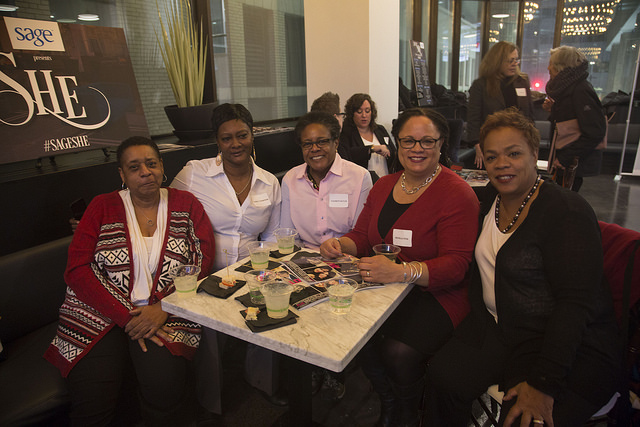I’m always pleased to see great activists and icons of the Civil Rights Movement, inventors, artists, academics and musicians celebrated during Black History Month. Historically most have experienced interlocking oppressions of race, class and gender, and have shared stories through biopics and documentaries, while unsung heroes and survivors among us share their stories in small communities throughout the country. Many older adult minorities continue to report facing minority stressors within and outside of our communities (Velez, Moradi, & Brewster, 2013). This Black History Month, while we are remembering significant people and events in the history of the African diaspora, let’s take a closer look at the stress, struggle and resilience that continues to impact the lives of aging older adults in our LGBTQ communities.

Attendees of SAGE’s 2017 SHE Party. (Photo courtesy of SAGE.)
One of the leading concerns reported by aging sexual minorities is good physical and mental health through mid-life and into retirement. Older sexual minority adults desire to maintain physical activity along with continued community and social engagement during retirement. Mental health factors include feelings of loneliness and depression in older sexual minority adults and access to adequate treatment services. Ageism, racism and sexism increase the likely experience of isolation, loneliness and depression for older adult minorities. Social statuses all intersect to form different meaning and experiences. The minority stress model (Meyer, 1995) was created from wide-ranging ideas of social stress theory, and it aims to highlights the distinctive traumatic experience of individuals whose place is or is assumed to be within a socially disadvantaged group (LeBlanc, Frost & Wight, 2015 p.40). The basic tenets of minority stress can be applied to all persons with minority status coping with difficult social situations that potentially impact health and well-being.
The minority stress model was later expanded by Meyer (2003) to include the stressor of identity concealment for LGBTQ persons (Carter, Mollen and Smith, 2013, p. 169). Mental health, well-being and coping for older adult LGBTQ populations is often examined using the minority stress model considering the impacts of prejudice and discrimination stressors. Older adult sexual minorities are coping with challenges of difficult social situations and face adverse health outcomes due to minority stress. Research confirms that exposure to distal and proximal stressors additionally causes individuals to suffer adverse health outcomes. Sociocultural dishonoring of sexual minority individuals promotes the identified minority stressors. These stressors are found significant to the psychological well-being and welfare of this marginalized group (Velez, Moradi, & Brewster, 2013 p.532).
Although there is a concentration on health problems in the lives of sexual minorities, there still exist positive affirming accounts of well-being and resilience among this aging population. Scholarly research reports validate that most are aging well, feel healthy, living contently with solid personal and community ties (Fredriksen-Goldsen, 2014, p. 88). Remaining actively engaged socially and continuing to be productive in retirement and old age includes embracing new social settings. Resiliency also includes the retention and cognitive abilities to understand and problem solve everyday situations. To ameliorate the potential negative health outcomes for older adult sexual minorities, the stigmatization must continue to be addressed. Hopefully, a better understanding of diverse older adult communities will impact practitioner’s delivery of service, and improve well-being and adjustment to normative aging.
References:
- Carter, L. W.,II, Mollen, D., & Smith, N. G. (2014). Locus of control, minority stress, and psychological distress among lesbian, gay, and bisexual individuals. Journal of Counseling Psychology, 61(1), 169-175. doi:10.1037/a0034593
- Fredriksen-Goldsen, K. I. (2014). Promoting Health Equity Among LGBT Mid-Life and Older Adults. Generations, 38(4), 86-92 7p.
- LeBlanc, A. J., Frost, D. M., & Wight, R. G. (2015). Minority stress and stress proliferation among same-sex and other marginalized couples. Journal of Marriage and Family, 77(1), 40-59. doi:10.1111/jomf.12160
- Velez, B. L., Moradi, B., & Brewster, M. E. (2013). Testing the tenets of minority stress theory in workplace contexts. Journal of Counseling Psychology, 60(4), 532-542. doi:10.1037/a0033346
The opinions expressed in this article are those of the author and do not necessarily reflect those of the Diverse Elders Coalition.

